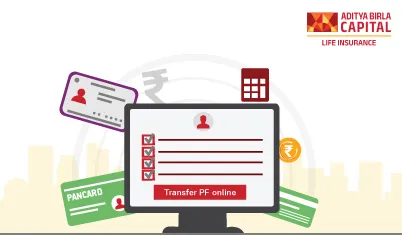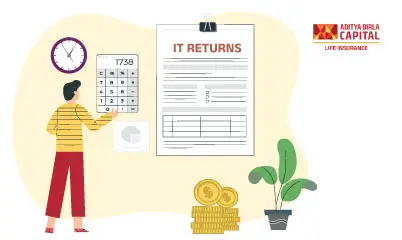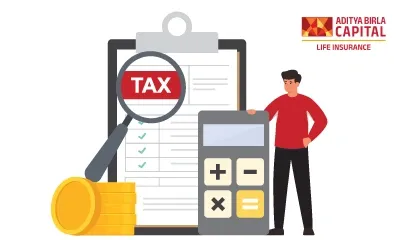Aditya Birla Sun Life Insurance Company Limited
What is Income Tax Return (ITR) and How to file ITR?

Plan Smarter, Live Better!

Thank you for your details. We will reach out to you shortly.

Currently we are facing some issue. Please try after sometime.


- Table of Contents
As a resident of India, who earns a regular income through one or several sources, an individual or entity is required to pay taxes on that income to the Government. This process of paying income tax to the Government is done through the means of filing income tax returns (ITR).
Besides individual taxpayers, companies, associations, or bodies of individuals, firms, and Hindu Undivided Families (HUF) who pay taxes on their respective income are also liable to file their income tax returns. However, for individual taxpayers, the income tax returns shall be filed and processed differently based on his/her age, sources of income, and the tax slab.
To know more, here is what you need to know about income tax returns:
Is Income Tax Return Filing Mandatory?
As per the Indian Income Tax Act of 1961, an individual or entity is required to file their income tax returns on income earned from all sources, above the basic tax exemption limit of Rs. 2.5 Lakhs. Over and above this income limit, an individual's tax liability is pre-decided by the income tax department according to applicable tax rate slabs. However, it is a sound practice to file income tax returns, irrespective of one's income.
An exception to this basic rule is that senior citizens above the age of 75 who receive a pension as their sole income are not required to file an income tax return from FY 2020-21.
Upon filing the tax returns by submitting the ITR form online, an individual shall be informed if he has paid taxes in excess during the given financial year. In such cases, the taxpayer shall be eligible for a refund from the Income Tax Department.
Reasons to File Income Tax Returns
Most citizens in India seem to take filing income tax returns for granted and it is not a healthy sign in terms of tax collection. Filing tax returns is an annual ritual that needs to be worn as a responsibility by every citizen. Here are few reasons why you need to file your income tax returns well within time:
A Sign of Responsibility:
While filing returns is mandated by the government for those earning above a specified annual income limit, it also makes sends a signal that as a responsible citizen of the country, you shall not shy away from filing taxes within the prescribed deadline and avoid any penalties
Claim Adjustment:
Past losses incurred by an individual or business in a given financial year cannot be claimed for tax exemption in the subsequent financial years. Thus, it is important to file the tax returns in time so that the losses can offset your tax liability for a given year
Revised Returns:
Taxpayers who file an original return for a given financial year shall be eligible to file a revised return in the future, whenever necessary. This is a pertinent point to be remembered by voluntary taxpayers as non-filing income tax returns can attract a penalty of Rs. 5,000
Proof to Apply for Credit:
Your ITRs can serve as financial proof for credit companies and financial institutions while considering your loan or credit card application. A steady record of ITRs shall ensure that your application gets approved.
What are the categories of persons that need to file ITR?
As framed by the Indian Tax laws, the following are the categories of individuals and entities that must compulsorily file an ITR, provided their incomes fall within particular tax slabs:
- Individuals aged less than 60 years whose total income exceeds Rs. 2.5 Lakhs
- Senior Citizens (aged between 60 and 79 years) whose total income exceeds Rs. 3 Lakhs
- Super Senior Citizens (aged 80 years and above) whose total income exceeds Rs. 5 Lakhs
- Registered companies that generate income, irrespective of the quantum of income
- Individuals or entities who have paid excess tax and wish to claim a refund
- Individuals possessing overseas financial assets or entities
- Foreign companies enjoying treaty benefits over transactions done in India
- Non-Resident Indians (NRIs) who accrue above Rs. 2.5 Lakhs in India annually
Important documents for Filing an ITR
Before filing income tax returns, it is important to collect all the relevant documents such as income and tax-saving investment proofs to avoid any errors while filing. Here is a detailed list of documents required for filing an ITR:
Form 16:
This is a document that will be provided by your employer and contains comprehensive information about your salary, allowances, and various applicable deductions.
a) Form 16A –
For TDS deducted on income sources such as fixed deposits, recurring deposits, etc.
b) Form 16B –
Provided by the buyer for TDS deducted on the amount paid to the seller for selling a property
c) Form 16C –
Received from the tenant for TDS deducted on the rent received by the owner
Salary slips:
If you are a salaried taxpayer, your salary slips contain the various details regarding your overall salary as well as the allowances provided out to you. Make sure to keep these safe as they can be essential to the process of ITR filing.
Form 26AS:
This form is your annual consolidated statement of not just taxes related to your salary but also the TDS, TCS dedicated from other income sources, advance tax, and self-assessment tax, home loan amount paid by you during a given financial year.
PAN card:
This document serves as proof of identity and is essential for every taxpayer.
Aadhaar Card:
Aadhaar card is also a mandatory document required for income tax return filing. You must also make sure that your PAN card is linked to your Aadhaar card to ensure that your ITR filing process is smooth and efficient.
How to File an ITR
Income Tax returns in India can now be filed online through a robust electronic filing (e-filing) interface of the Income Tax Department. This electronic filing of income tax returns means that there is no more hassle of paperwork and
you can complete the entire process from the comfort of your home or office. With the convenience of online filing of income tax returns, it is now also easier for you to track the status of your ITR filing at any time.
E-filing income tax returns has several benefits making it an increasingly popular option to file taxes. Here are some key benefits that taxpayers can avail themselves through e-filing:
Refund Claim:
Taxpayers who wish to claim TDS as per the income tax laws can now file an ITR for claiming a refund.
Simple Documentation and Verification:
ITR forms help the taxpayer document and prepare their income profile that can come in handy while applying for loans, as the loan eligibility of an individual depends on his/her income. The ITR document is enough to satisfy the lender about your financial capability to repay the loan.
Income proof:
Insurers usually require proof of income to decide on the compensation amount to be paid in the event of disability or accidental death of the insured. In such cases, the ITR serves as an official and authentic income proof for the insurer.
While e-filing is a popular process to file taxes, ITR can also be filed offline by downloading the 'Sahaj' form from the official website of the Income Tax Department. The form once duly filled and submitted needs to be verified within 120 days from the date of filing. An ITR-V shall be generated as acknowledgment upon verification of the return.
What are the ITR forms to be filled by a Taxpayer?
The ITR forms to be filled by a taxpayer varies as per their source of income. Here is a quick guide that shall help understand these forms:
ITR-1:
Also called the Sahaj form, it is filed by individuals who are residents in India having a total income upto Rs. 50 Lakhs from salaries, deposits, properties, etc., and agricultural income below Rs. 5000
ITR-2:
To be filed by individuals and HUFs with no income from any business or professional gains
ITR-3:
To be filed by individuals and HUFs with income from any business or professional gains
ITR-4:
Also known as Sugam, this form is to be filed by individuals, HUFs, and entities who are residents with a total income of upto Rs. 50 Lakhs and also sourcing income from any business or profession computed under sections 44ADA, 44AD and 44AE
Conclusion
Income tax returns are an important responsibility for all Indian citizens and should be carried out in a diligent and timely manner. Now that income tax return filing has become an online process, it is now even more convenient to file and record your ITR without excessive paperwork. Every financial year, make sure to collect the documents you need and file your income tax return on time to avoid paying penalties.
Thank you for your details. We will reach out to you shortly.
Thanks for reaching out. Currently we are facing some issue.
Buy ₹1 Crore Term Insurance at Just ₹575/month1
ABSLI DigiShield Plan
Life cover up to 100 years of age.
Joint Cover Option
Inbuilt Terminal Illness Benefit
Tax Benefit^
Return of Premium Option~
Life Cover
₹1 crore
Premium:
₹575/month1
Most Popular Calculator
Guaranteed returns after a month¹
ADV/3/20-21/2688







